Chicago
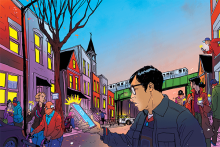
AS ORGANIZERS IN her city began preparing for the No Kings protest in October 2025, Erin Groble thought seriously about whether she should attend. On the one hand, she felt the need to do something. She was raised Lutheran and attended the Jesuit Loyola University in Chicago, and the increased presence of federal agents in Chicago challenged her to figure out what it meant to love her neighbor. On the other, she was genuinely scared at the possibility of being physically harmed or getting into conflict with authorities.
“I realized it just wasn’t really authentic to who I was. It just didn’t feel like the right thing for me to do,” Groble told Sojourners. “But then I started thinking, ‘OK, well, what is the right thing for me to do?’”
Groble was already part of a group chat organized by Brendan Curran, a Catholic priest and community organizer with The Resurrection Project. Curran had brought her block about 50 yard signs advertising “Know Your Rights” information via QR codes. Groble and her neighbors had planted a few of the signs, but there were plenty sitting in her neighbor’s home. “Yard signs are kind of hard to put up—especially in the city!” Groble said. “You have to find a place to put them; there’s a lot of concrete here and a lot of the soil is compacted. So, you need a lot of determination. I just went on my normal walking route, and in front of schools, by parks, by bus stops, I put them all up.”

The early seasons of Stranger Things hit different in 2025. I realized this as I rewatched the series ahead of the final season’s premiere. Watching federal agents sow mistrust and harm children no longer seems like a sci-fi nostalgia trip, and the creeping evil influence of the Upside Down feels more like commentary on current events than a Stephen King pastiche. In fact, in fighting for the world they want and practicing radical solidarity, the kids in Hawkins, Ind., teach us exactly the lesson we need for right now. Stranger Things might even be a modern-day parable.
When the show debuted in 2016, it was a smash hit and proved that Netflix could compete in the original-content arena. Following a group of teenagers and the adults they trust in a fight against the forces of evil, the show owes much of its success to ’80s nostalgia. The group has fought various monsters over its seasons, many of which took cues from Dungeons & Dragons, but Season 4 took a more psychological turn, focusing on a being that feeds on the ongoing trauma people in Hawkins have experienced in their personal lives.
Chicago is in a state of holy rage. Last Friday morning, I stood with many of my colleagues in ministry at a multifaith service outside the Immigration and Customs Enforcement processing facility in Broadview, Ill. It would be better to call this facility an abduction center, as those who are detained there have little to no contact with the outside world.
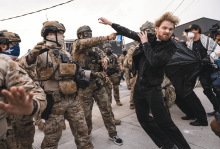
I WAS NEVER the smartest seminarian, but I read my Bible every day. I feel rooted in the scriptures and formed by what I see Jesus teaching us and how he’s calling us to imitate him. I was moved in that moment to pray in the verbatim words of Jesus, to warn the ICE officers who were standing on the roof about the spiritual consequences of their actions in language that was not just me—[it] was an echo of scriptural prophetic language talking about how generations after them would view their actions and calling them to repent.
On Oct. 28, U.S. Border Patrol Chief Gregory Bovino sat before U.S. District Judge Sara Ellis, who had ordered him to appear in court after attorneys accused him of throwing tear gas into a crowd in the Little Village neighborhood. Bovino was selected by the Trump administration to lead its immigration raids in Chicago—dubbed “Operation Midway Blitz.”
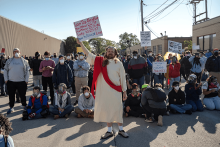
In response to ongoing federal threats from President Donald Trump, Chicago faith leaders organized a surge of solidarity to protect the most vulnerable. Alongside a deep pride for their city, some of the organized actions share a critical motif: joy.
Community leaders in Chicago were already alert to the threat that Trump posed to immigrant communities in Chicago when the president began hinting at sending the National Guard into the city to support Immigration and Customs Enforcement agents and cut the crime rate of what he falsely claimed to be the most dangerous city in the world. For some of the faith leaders, it was important that they protest not just the dangerous influx of troops, but also the false narrative surrounding their city.
“We’re called to be constantly rejoicing,” Rev. Juan Pablo Herrera told Sojourners. “It’s a spiritual strength that we can have in times of negativity coming against us, that we can choose to live with joy as a way of defying the forces of principality.”
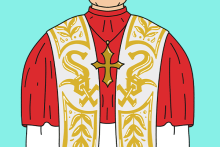
SHORTLY AFTER THE Vatican announced that Cardinal Robert Francis Prevost, a Chicago native, would be the next pope, the Cubs changed the iconic Wrigley Field sign to read, “Hey, Chicago, He’s a Cubs fan!” Then Pope Leo’s brother John refuted the claim. Apparently, Leo loves the White Sox, which is convenient, given that their colors more closely match the papal vestments. While this revelation is a big loss for the Cubs (they’re used to that, fortunately), it’s still a huge win for the city of Chicago. In June, Chicagoans (even Cubs fans!) swarmed to the White Sox’ Rate Field to hear Pope Leo address his hometown’s faithful via Jumbotron in what Chicago Cardinal Blase J. Cupich called “the sermon on the mound.”
Clearly, the new pope’s love of the Windy City runs deep, so we’ve put together a list of hometown facts about Pope Leo (Chicago Man) XIV. While all unverified by the Vatican, some truth could be hidden here. Stranger things have happened: a man on the moon, an American in the popemobile.

As we enter a second Donald Trump presidency, the stakes could not be higher for undocumented people and asylum seekers in this country. Having promised mass deportations to a degree never attempted in the United States, President-elect Trump’s new border czar, Tom Homan, has signaled that the administration’s cruelty will begin in my backyard — Chicago. What he might not be counting on is organized resistance from labor, faith, and immigration leaders that will attempt to thwart these plans.

In 1985, Chicago Mayor Harold Washington passed an ordinance prohibiting city workers from cooperating with immigration police to detain and deport undocumented migrants. With this ordinance, Chicago became a sanctuary city, joining other U.S. cities in resisting policies that criminalize migration. Almost 40 years later, Republican Gov. Greg Abbott has used Chicago’s sanctuary status as an excuse to bus and fly thousands of migrants to the city from Texas, where he has instituted strict migration policies.
Since Texas began bussing and flying migrants to Chicago in 2022, the city has welcomed over 30,000 migrants. These migrants have endured terribly cold winters, undignified housing, and a city divided by feelings of frustration, indifference, and solidarity.

Jonathan Brooks is now the lead pastor of Lawndale Christian Community Church in the Chicago neighborhood of North Lawndale. The major theological conviction of LCCC is to love God and love the neighborhood, which is predominantly Black and has experienced years of government disinvestment. The way the church community puts into practice its theological convictions is by working with neighbors to improve the material circumstances of all who live there.

MY DAD HAD a very mixed relationship with America. Based in his experience of and feelings concerning white supremacy in America, I was never sure he loved America and knew with certainty that he hesitated to call it “home.” America was never holy ground for him.
On Jan. 6, 2021, while I was watching the Capitol insurrection on TV, he died in his hospice bed. My screen view of the Capitol mob’s recitation of “hang Mike Pence,” in rhythmic incantation to bring forth the blood-boiling hate, was reminiscent of the ritualistic lynching of thousands from 1870 to 1940, particularly and almost exclusively African Americans.
I also had a screen view of my dad. Given the threat posed by COVID-19 exposure upon his chemotherapy-treated and compromised immune system, we were not able to visit him as we would have liked. My sister had installed a camera system to get a visual. I noticed that he was not moving. I earnestly studied his lack of motion and noticed that his mouth was wide open. This was the death posture. I instantly knew he was gone.
Trying to come to grips with the death of my father, while staring with glazed-over eyes at the Capitol riot, I said to myself: “The insurrection took my dad out of here. He had enough of white supremacy in America.” During the chaos of the insurgency, my dad became an ancestor. In the stark reality of his death, I realized he had been in search of holy ground for a long time.
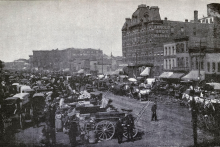
Historian Timothy E.W. Gloege explains in his book Guaranteed Pure that before the events of Haymarket, Christian evangelist Dwight L. Moody conspired with local capitalists such as Cyrus McCormick Jr., one of the managing partners of International Harvester Company, to thwart the 1886 strike altogether. Within the story of the Haymarket affair, we can find a number of political tensions that are still within Christianity today. One major tension still animating Christian discourse is this: What happens when Christians side with the wealthy instead of the poor and working class?
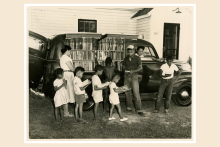
In keeping with the Black radical tradition and the story of the Israelites plundering the Egyptians before they fled Egypt (Exodus 12:35-38), I see my job as a library fellow to be transgressive insofar as I encourage students to "steal Egyptian gold." Libraries are not just places to check out books but spaces where transformative visions can be cast, organizers and students can meet, and institutional knowledge can be turned upside down. Much like the late Black Mennonite, Vincent Harding, or modern Black intellectual Fred Moten, I believe it is the work of scholar-activists to figure out ways to be in but not of institutions. In other words, we must figure out ways to redistribute Pharoah’s spoils for the sake of the mixed multitude.
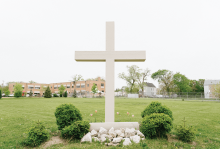
ONCE A MONTH, 30 mothers and grandmothers gather at the Precious Blood Ministry of Reconciliation in Chicago. The women share a meal before coming together in a circle. Facing each other in their chairs, they begin to share stories of painful loss.
Sister Donna Liette, who coordinates the organization’s Family Forward Program, created this space 10 years ago for women who have lost children and grandchildren to gun violence or incarceration. Gun violence has been a devastating reality in the city for decades. In 2020 alone, the Cook County Medical Examiner reported 875 gun-related homicides. And while incarceration rates have declined in recent years, Illinois had approximately 38,000 incarcerated individuals in 2020, according to the Henry Frank Guggenheim Foundation.
Liette says she keeps in touch with around 80 women through the program, many of whom attend the monthly gathering. Judy Fields is one of them. Three of her grandchildren have been killed by gun violence in the Back of the Yards neighborhood.
“I first met Sister Donna four years ago, and we became instant friends,” Fields said. “I don’t have anybody to talk to, and she fills that void. She looks after me—she knows how to listen.”
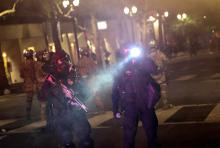
The writer, James Baldwin, stated in 1962, “It is, alas, the truth that to be an American writer today means mounting an unending attack on all that Americans believe themselves to hold sacred.” It is the truth that to be a person of faith in America today, is to recognize that America desires Jesus slogans over morally grounded Jesus-inspired action.
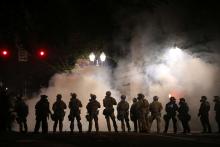
“As a community, we will resist such unconstitutional action by any morally rooted means we deem necessary,” said Rev. Dr. Otis Moss III. “We are a city of grit, grind and resistance, unafraid to speak truth to power.”
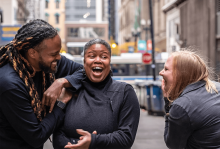
AT THE TIME most people head home after a typical workday, four musicians are just getting started. In a living room filled with holiday decorations and religious artwork, with inspirational phrases on the walls and bookshelves, Darren Calhoun, Leslie Michelle, Hannah Rand, and Gary Rand are rehearsing.
Together, with Leonora Rand, they are The Many, a Chicago-based, social justice-focused worship band that pulls from gospel and indie pop to sing about topics not usually mentioned in worship music or church. Their songs touch on police brutality, LGBTQ and immigrant inequalities, economic hardship, identity and uncertainty about faith and God, and doubt and justice amid violence.
“We were trying to find some songs that could give honest voice to our congregation, to what we were dealing with,” says producer Gary Rand, a longtime musician and former director of worship at LaSalle Street Church in Chicago, as well as former director of worship and adjunct professor at McCormick Theological Seminary for 20 years. He says the band always felt a need for this kind of music, but once the group solidified in 2016 with its current members, its mission of speaking truth with a social justice lens to community issues took off.

BEFORE SUNRISE, the Chicago Federation of Labor team hit the city streets in an SUV packed with fresh donuts and hot coffee. We were bringing encouragement to picketing Chicago Teachers Union (CTU) Local 1 and Service Employees International Union (SEIU) Local 73 members. A cold front swept through on the first day of the Chicago public schools strike, which launched tens of thousands of public school teachers and school support staff into the streets in October, but it could not chill the fire for justice in the union members. They wanted something better not just for themselves but for the children they taught and cared for and the communities they came from.
Our first stop was Pulaski International School in Logan Square, home to nearly 900 students. The teachers and support staff were already on the sidewalks—wearing red for CTU and purple for SEIU 73. The teachers and staff at Pulaski identified class sizes and more prep time as key challenges.
We drove south to East Garfield Park, stopping at Westinghouse and Marshall high schools. Several NBA and NFL stars and other notable Chicagoans graduated from these schools. Sadly, during the strike, gunfire claimed the life of a Marshall student. Teachers and staff said more counselors and nurses were needed. Cardenas and Castellanos elementary schools also needed counselors. Immigration and Customs Enforcement raids have traumatized many of the children, who have seen relatives and classmates disappear.
One of the last schools we visited was Ida B. Wells Elementary in Bronzeville, where poverty is the school’s biggest challenge. Dozens of students showed up at the closed school because they had nowhere else to go and nothing to eat.
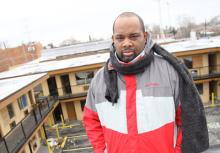
In 2012, Pastor Corey Brooks spent 94 days living on a motel roof. He only came down for two funerals, which happen often in his community. He was protesting the motel owners, who were involved in local sex trafficking and gang violence that had a stronghold on his South Side Chicago community. Brooks’ goal was to convince the owners to sell the property and end the illicit activities. Eventually they caved, and Brooks was able to buy the lot with help from actor and filmmaker Tyler Perry and Ozinga Concrete, one of the longest-serving family businesses in Chicagoland.
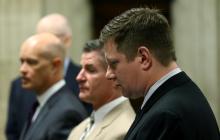
"There's no justification for shooting Laquan McDonald that night," prosecutor Jody Gleason said on Thursday. "Not one shot. Not the first shot. Not the sixteenth shot."